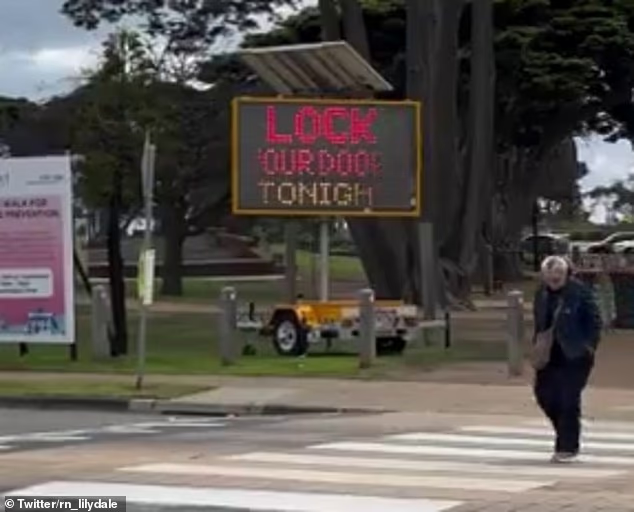
Content warning: This article contains references to violent crime and youth deaths.
When a roadside sign in Mornington told residents to ‘lock your doors tonight’, it carried more weight than a routine safety tip.
The bright LED letters felt less like prevention advice and more like a warning of danger creeping closer to home.
For many Victorians, the message became a symbol of a city where fear now lingers in the suburbs.
The electronic board, usually used for traffic updates, instead delivered a grim reminder: ‘Most common method of aggravated burglary entry? Via unlocked door.’
Locals said it felt like an admission that safety was no longer guaranteed, but rather a matter of vigilance and locked latches.
The timing of the sign was striking—it appeared only days after Victoria’s machete ban officially began on 1 September 2025.
The ban outlawed ownership, sale, and transport of machetes without exemption, with fines reaching over $47,000 or jail terms of up to two years.
The law had already been under scrutiny, but public anger swelled after two young boys—15-year-old Dau Akueng and 12-year-old Chol Achiek—were killed in Cobblebank on 7 September by a machete-wielding gang as they walked home from basketball.
The tragedy followed earlier incidents, including gang violence at Melbourne’s Northland Shopping Centre, which pushed the Allan Labor Government to launch an interim sales ban in May.
'When Melbourne residents are told to 'lock your doors' like it's a war zone, you know Victoria is broken. This isn't safety, it's surrender.'
Critics argued that while police seized nearly 15,000 edged weapons in 2024, no data had been released showing how many of those were actually machetes.
Security experts described the state ban as porous and costly without federal coordination or tighter controls on digital marketplaces.
As part of the rollout, more than 40 disposal bins were installed at police stations for anonymous surrenders during a three-month amnesty.
Victoria's Machete Amnesty Program
Running from September 1 to November 30, 2025
Over 40 disposal bins at police stations across the state
Anonymous surrender without penalty during amnesty period
Can also dispose over-the-counter at any police station
Exemptions exist for agricultural workers and items with cultural significance
For older Australians, the Mornington sign stirred memories of a very different era.
Many recalled when doors were left unlocked and safety was assumed, not reinforced through flashing warnings.
The stark message brought home just how much community expectations had shifted.
The state government pointed to record weapon seizures and tougher bail conditions as proof of stronger crime prevention.
Yet residents questioned why they were being told to treat their own neighbourhoods as if they were conflict zones.
The debate revealed a wider gap between official assurances and how safe Victorians actually felt.
The machete ban was also raising headaches for retailers, with hardware and outdoor stores burdened with stock losses and unclear guidance on what items might fall under the restrictions.
Victoria has asked the Federal Government to extend bans to imports and consider national action, signalling the issue is far from confined to one state.
For now, the roadside sign in Mornington has become a lightning rod for frustration, a reminder that statistics and policies mean little when fear follows people into their own homes.
Essential home security reminders for seniors
- Always lock doors and windows, even during short absences
- Install quality deadlocks on all external doors
- Consider motion sensor lights for outdoor areas
- Keep valuable items out of sight from windows
- Establish a routine for checking locks before bed
- Consider joining a neighbourhood watch program
What This Means For You
The Mornington sign came to symbolise far more than simple crime prevention—it reflected the deep fear spreading through Victoria. The state’s machete ban, while introduced with urgency, sparked debate over whether it was truly effective and fair to retailers left with financial losses.
Despite record police seizures and tougher laws, community confidence in safety continued to fall, leaving many residents unconvinced by government reassurances. Most heartbreaking of all were the deaths of Dau and Chol, which served as a stark reminder of the devastating human cost behind policy debates.
For older Australians, who remember a time when doors were left unlocked and neighbourhoods felt safe, these changes hit especially hard, raising difficult questions about what kind of society we are leaving for the next generation.
Machete ban | vic.gov.au — Consumer Affairs Victoria confirmed that from 1 September 2025, it became illegal to own, use, carry, transport, sell or buy machetes without exemption.
https://www.vic.gov.au/machete-ban
Machete Ban Starts Tomorrow | Premier — The Allan Labor Government announced that owning, carrying, using, buying or selling a machete without approval is now an offence, with penalties including jail time or heavy fines.
https://www.premier.vic.gov.au/machete-ban-starts-tomorrow
A Cut Above the Rest? Evaluating Victoria’s Machete Ban in the Context of Public Safety and Practical Enforcement | Security Solutions Media — Security experts questioned the effectiveness of the ban, noting Victoria Police seized 14,797 edged weapons in 2024 but provided no data on machetes specifically.
https://www.securitysolutionsmedia....t-of-public-safety-and-practical-enforcement/
Machete Amnesty and Machete Safe Disposal Bins | Victoria Police — Victoria Police detailed the amnesty program with more than 40 disposal bins installed at police stations, allowing anonymous surrender of machetes.
https://www.police.vic.gov.au/machete-amnesty-and-machete-safe-disposal-bins
First Machete Ban In Australia | Premier — Victoria confirmed it will lobby the Federal Government for national action on machete imports and the possibility of a broader national ban.
https://www.premier.vic.gov.au/first-machete-ban-australia
The warning sign in Mornington wasn’t an isolated incident—it tied into wider concerns about whether new laws are actually keeping people safe.
One tragic case in Cobblebank showed just how devastating the consequences can be when safety measures fall short.
It’s a sobering reminder that behind every policy debate are real families facing heartbreaking loss.
Read more: Machete ban promised safety…yet two children just died within metres of each other
Do you think the Mornington sign was practical advice or a warning of something deeper wrong in our society?







